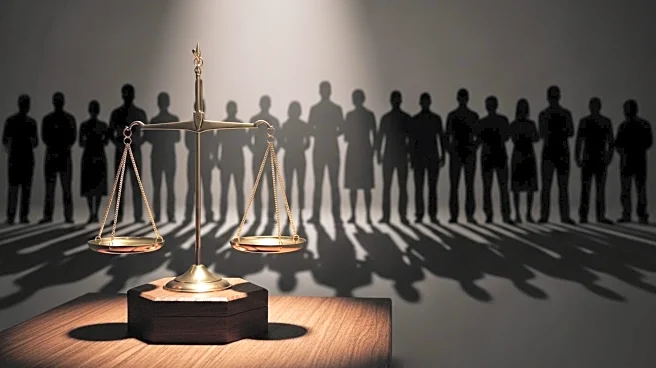What is the story about?
What's Happening?
Jane Fonda has re-launched the Committee for the First Amendment, a group originally formed in 1947 by her father, Henry Fonda, and other Hollywood figures in response to congressional hearings targeting screenwriters and directors for alleged Communist ties. The modern incarnation of the group aims to combat what it perceives as a coordinated government effort to silence critics across various sectors, including media and entertainment. The mission statement of the revived committee emphasizes the importance of free speech and expression as fundamental rights for all Americans, regardless of political beliefs. The initiative has garnered support from over 550 individuals, including notable figures such as Florence Pugh, Sean Penn, and Billie Eilish. This revival comes amid recent controversies, including the suspension of Jimmy Kimmel by ABC following comments made after the assassination of conservative activist Charlie Kirk, with President Trump and FCC Chair Brendan Carr calling for Kimmel's firing.
Why It's Important?
The revival of the Committee for the First Amendment highlights ongoing tensions surrounding free speech in the United States, particularly in the entertainment industry. By mobilizing a large group of supporters, Jane Fonda is drawing attention to perceived threats against free expression, which could influence public discourse and policy decisions. The involvement of high-profile celebrities underscores the significance of the issue and may amplify its impact on public opinion. This development could lead to increased advocacy for free speech rights and potentially affect how media companies and government entities handle criticism and dissent. The initiative also reflects broader societal debates about the balance between free speech and accountability, especially in politically charged environments.
What's Next?
The Committee for the First Amendment is likely to continue its advocacy efforts, potentially organizing events and campaigns to promote free speech rights. Stakeholders such as media companies, government officials, and civil society groups may respond to the committee's actions, either by supporting its mission or by challenging its assertions. The committee's activities could influence legislative discussions on free speech protections and lead to increased scrutiny of government actions perceived as suppressing dissent. As the committee gains momentum, it may attract further attention from political leaders and activists, potentially shaping future debates on the role of free expression in American society.
Beyond the Headlines
The revival of the Committee for the First Amendment also raises questions about the historical context of free speech advocacy in the United States. The original committee faced challenges related to accusations of Communist sympathies, reflecting the complex interplay between political ideology and free expression. The modern iteration of the committee may encounter similar challenges, as it navigates contemporary political dynamics and seeks to address issues of censorship and government overreach. This development could prompt a reevaluation of historical lessons and inform current strategies for defending free speech rights.















